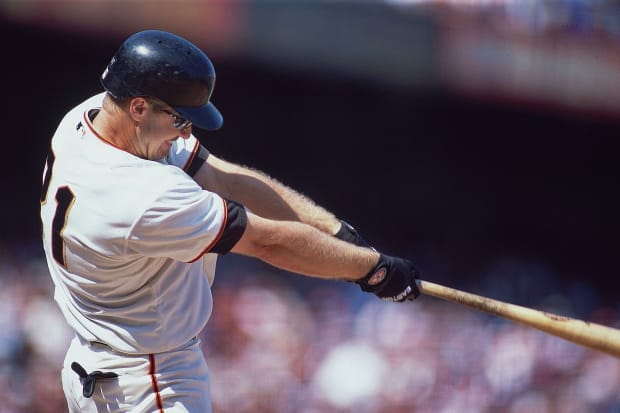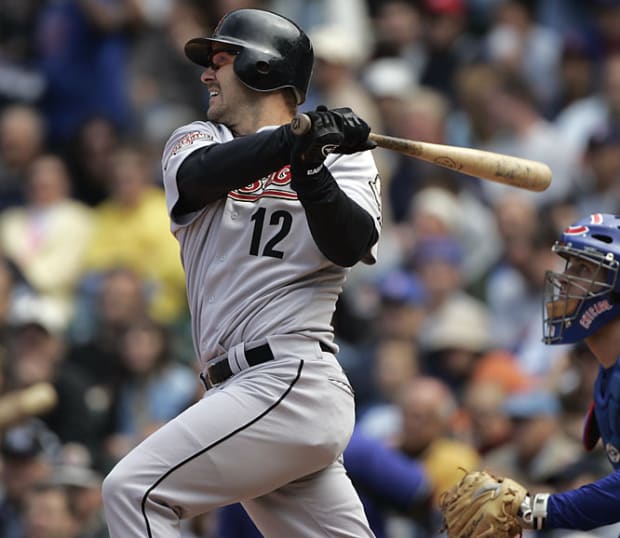The all-time home run leader among second basemen continues to get overlooked, but he belongs in Cooperstown.
Before the Giants started a dynasty in the early 2010s with a cast of lovable oddballs and outcasts, they tried to win their first World Series since moving to the Bay Area in 1958 with a core anchored by two of the surliest sluggers in the league.
Barry Bonds was drawn to San Francisco in 1993 by what was at the time the largest contract in MLB history (six years, $43.75 million) and the allure of playing for the same team where his father and godfather starred. Jeff Kent was one of four players traded to the Giants in '96 by Cleveland for fan favorite third baseman Matt Williams, a swap so detested by the team’s fans that new GM Brian Sabean had to clarify he was “not an idiot” in a press conference days after the deal.
The two instantly clashed. One day during his first spring training, Kent unknowingly took Bonds’s seat on the team bus. Bonds, who was used to getting his way, told him to move. Kent refused. Bonds, to the shock of his teammates, eventually acquiesced. It would be the first of many arguments between the two (the most famous of which was an ugly dugout brawl in which Bonds appeared to briefly grab Kent by the neck). But it also set the tone for perhaps the most productive one-two punch in the sport during their time together.
The rivals reluctantly coexisted in the same clubhouse while bashing a combined 479 home runs (Bonds 304, Kent 175) and occupying the third and fourth spots in San Francisco’s lineup for six years, all of which were winning campaigns. And yet just as Bonds and Kent never quite won a World Series together, coming agonizingly close during their final season together in 2002, they seem destined to fall off the ballot for induction in Cooperstown—fittingly, one right after the other.

V.J. Lovero/Sports Illustrated
This is the 10th and final year that Bonds, MLB’s all-time home run leader, will be on the writers’ ballot for the Hall of Fame, signifying the end of one chapter of an exhausting debate over the worthiness of PED users. It’s also the ninth and second to last year that Bonds’s greatest teammate will be on the ballot. Kent has barely received half the support Bonds has from voters despite being something of a home run king himself; he's the all-time leader among second basemen (377 career home runs, 351 at the keystone) and has never been connected to PED use.
Kent’s voting percentage hovered in the teens for the first six years of his candidacy before seeing consecutive sizable jumps over the last two years to 32.4% as the ballot emptied out a bit—still well below the 75% required for induction. Another crunch seems to have ruled out a meteoric rise into Cooperstown. According to Ryan Thibodaux’s indispensable HOF ballot tracker, Kent already has lost three votes from his 2021 BBWAA proponents as a couple of slam-dunk statistical candidates (if not in reality) in David Ortiz and Alex Rodriguez, who are making their debuts this winter, as well as a fellow one-time NL MVP in Jimmy Rollins. Kent’s 24.5% approval rate on the 50 public ballots released, as of Wednesday morning, would be his lowest percentage since '19 (18.1%).
Is this the deserved fate for the best home run hitter at his position in MLB history? It’s a title that’s not really up for debate. Kent hit 43 more homers than Robinson Canó, who owns the second-most among second basemen and 76 more than third-place Rogers Hornsby, who’s the only second baseman in Cooperstown with a slugging percentage (.577) higher than Kent’s (.500).
A self-described “beach boy turned cowboy,” the son of a police officer grew up in Huntington Beach, Calif., with two younger brothers before living in Texas for much of his major league career and following his retirement from baseball (undoubtedly in part due to his famous hatred of taxes). A 21st-round pick by Toronto out of the University of California (which he later donated $100,000 to in order to save its baseball program when it was nearly cut in 2011), he skipped Triple A because he was called up during the first week of the season after an injury at the big league level. He hit well enough to stick and was traded to the Mets for David Cone in 1992 as the Blue Jays geared up for a World Series run.
(Kent hilariously voiced his displeasure for taxes after he was eliminated as a contestant on Survivor: Philippines in 2012.)
Kent is perceived as a statistical compiler, which is pretty odd for someone who spent his first five seasons as an unremarkable infielder for the Blue Jays, Mets and Cleveland. But after realizing his potential with the Giants, he gained a reputation for playing through injuries and racked up some impressive counting numbers.
There are 20 Hall of Fame second basemen. Kent ranks 19th among second basemen in WAR and 21st in JAWS, a metric developed by former Sports Illustrated writer Jay Jaffe, currently of FanGraphs, to measure Hall of Fame candidates. Kent is one of just 15 second basemen to win an MVP award, which he did in 2000 by hitting .334 with 33 round-trippers, 125 RBIs and a 1.021 OPS—beating out his teammate and runner-up in Bonds in the process. His four top-10 finishes for the award are tied for 10th at the position, while his 2,462 career hits rank 13th. His 560 career doubles rank 30th among all hitters.
Kent’s five All-Star selections are on the low side, but he somehow managed to not be selected for the Midsummer Classic in three different seasons in which he also finished in the top 10 of MVP voting. He also may have merited greater consideration while playing for the lowly Mets, with whom his 55 homers between 1993 and '95 were tied for the most among second basemen with Carlos Baerga, who made two ASGs during that span. Kent and Baerga were traded for each other in '96, with Kent serving a short stint in Cleveland before landing in San Francisco, where his career took off.
Kent’s first season with the Giants yielded 29 home runs, then a career high. He never hit fewer than 22 in orange-and-black and recorded at least 100 RBIs in every season there, becoming the only second baseman in MLB history to do so for six straight years. He hit at least 30 homers in three different seasons with San Francisco. The Giants went on to make the playoffs in all six of his years with the club, snapping a seven-year drought that had continued during the first four years of Bonds’s stay. It advanced to the World Series in Kent’s farewell campaign in 2002, when he hit three homers during San Francisco’s seven-game defeat to the Angels. And while it’s true that at the very least Kent’s RBI count greatly benefited from his place in the batting order behind Bonds, who was frequently issued a free pass to first base by fearful pitchers, Kent was a feared slugger in his own right. Plus, hitting behind Bonds also meant hitting with the bases empty following a home run. He accumulated three All-Star appearances, three Silver Sluggers and four top-10 MVP finishes under manager Dusty Baker.

John Biever/Sports Illustrated
Kent was also no slouch after departing in free agency at age 34, posting an OPS of at least .860 in each of his next five seasons for Houston and Los Angeles. He hit a walk-off, three-run home run in Game 5 of the 2004 NLCS for the Astros against St. Louis before the Astros lost the two ensuing contests. He then led the Dodgers in virtually every offensive category in his first season with the team in 2005, eventually retiring after four productive campaigns in Los Angeles. His '07 season is one of just six in modern MLB history by someone at least 39 years old with a batting average of at least .300 and a slugging percentage over .500. The other five to do it: Bonds (of course), Ortiz, Ted Williams, Stan Musial and Andrés Galarraga.
It’s hard to square voters’ indifference to Kent when comparing him to one of his contemporaries, third baseman Scott Rolen, who’s been named on 73.6% of public ballots tallied by Thibodaux’s tracker despite possessing slightly worse offensive numbers at a position with higher offensive expectations.
The biggest difference between the two comes on defense. Rolen was superb at the hot corner, while Kent carried a reputation for having limited range and a stone glove. This wasn’t entirely undeserved, as he led NL second basemen in errors four times. But he also carried a reputation as being a tough son of a gun, and that was reflected in his willingness to absorb plenty of nasty slides as the pivot man on double plays—he led the NL in double plays turned in 2002. Advanced metrics also grade his range kinder in hindsight, as he ranked in the top four of range factor per game among NL second basemen seven times. All in all, Kent was not a terrific glovesman, but he wasn’t a liability, either. He should not be kept out of Cooperstown based on that aspect of the game.
I’ve wondered whether Kent’s curmudgeonly attitude has affected his candidacy. This is not a man who appears to have a lot of friends in the sport. In his first season with the Dodgers, in 2005, he and Milton Bradley clashed. Bradley, who is Black, said that Kent “doesn’t know how to deal with African American people.” Kent called Bradley’s comments “absolutely pathetic.” The truly enlightening response came from Kent’s former Astros teammate Lance Berkman, who said, “I think [for Bradley] to make it a race issue is ridiculous. [Kent] doesn’t discriminate against anybody. He ignores Latinos, Blacks and whites equally.”
Also while he was with the Dodgers, Kent once took a shot at Vin Scully by saying the legendary broadcaster “talks too much” after Scully insinuated Kent’s stellar second half could be attributed to the acquisition of Manny Ramírez. Kent was probably sensitive to such a suggestion after hearing for a decade how he owed much of his success to Bonds. But still—it’s Vin Scully, the one guy most people would pay to hear talk more.
Despite Kent’s rough exterior, he was respected. He won the 1998 Willie Mac Award for his spirit and leadership, served as San Francisco’s players' union representative and was at least better liked by his peers than Bonds, who isolated himself from teammates and the media in a way Kent did not. The two, however, were “more similar to each other than most people realized,” according to Baker. They were both proud family men and deeply stubborn—a trait that nearly derailed Kent’s professional baseball career before it even started.
A teenaged Kent was kicked off his high school baseball team after clashing with his coach when he was moved from shortstop, where he’d been a three-year starter, to second base in the middle of the season. Kent took it as an attempt to embarrass him, refused the assignment and turned in his jersey as requested before earning a college scholarship in summer ball.
The great irony here, of course, is that Kent became, by the sport’s most famous statistic, the best hitting second baseman of all time. Is that not worthy of a spot in the Hall of Fame?
More MLB Coverage:
• Why Jimmy Rollins Belongs in the Hall of Fame
• Nelson Cruz Is Still Booming
• MLB Roundtable: What Rules Must Be Changed in the Next CBA?
• MLB Is Not Even Trying to End the Lockout
• Reranking the Top-25 Free Agents